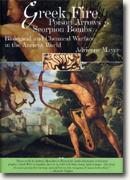Adrienne Mayor
book reviews:
· general fiction
· chick lit/romance
· sci-fi/fantasy
· graphic novels
· nonfiction
· audio books
· author interviews
· children's books @
curledupkids.com
· DVD reviews @
curledupdvd.com
newsletter
win books
buy online
links
home
for authors
& publishers
for reviewers

 |
Greek Fire, Poison Arrows & Scorpion Bombs: Biological and Chemical Warfare in the Ancient World Adrienne Mayor Overlook Press Hardcover 319 pages September 2003 |
|
Biological and chemical warfare are generally thought of as modern inventions. Most histories trace them back to first world war, with perhaps a mention of Greek Fire thrown in an as afterthought. In Greek Fire, Poison Arrows & Scorpion Bombs: Biological and Chemical Warfare in the Ancient World, Adrienne Mayor shows that these weapons, and the ethical debates of their use, have colored most of human history.
The issue is explored through ancient myths and contemporary accounts of battle and social responses. Mythical texts are used not as proof of historical happenings, but evidence of the options living in ancient thought. It’s hard to argue that a society with heavy laws and many fables warning against the use of poison arrows wasn’t at least aware of the possibility for such arrows to be created. The cross-referencing of historical battles and mythical heroes gives a fuller and more well-rounded view of her chosen societies than the examination of historical fact alone. Unfortunately, her mythical discussions are heavy on the Greek heroes, with little emphasis on the stories of Persia or India. Mayor unites her tales of Greek bioweapons with a detailed and thoughtful examination of the myths of Hercules; no such ongoing legendary exploration is available for the Persians. It’s an understandable shortcoming—most American audiences will be more comfortable with the Iliad than the Bhagavad-Gita—but it does remove some depth from the historical accounts of other civilizations. It’s fortunate, then, that those accounts need little embellishing. Mayor delivers her battle histories with all the horror—and sometimes humor—intact. There are no dry, detached lists of casualties here. Instead, there are frightening rains of burning sand, insidious flights of poison arrows, and the ominous threat of plague-carrying water. We get to see armies defeated by little more than their own appetites, as they rush into seemingly obvious traps set by other generals—or stumble into impossibly subtle natural disasters. Generals watch their forces routed by monstrous new animal weapons and decimated by deadly honey. Each account is set in the context of its times, in an engaging style that should be accessible to even causal history fans. Mayor also examines the moral questions raised by these means of attack, in the modern and ancient world. She makes it clear that the ancients cherished the myth of their brave warriors engaged in single combat as much as we do now. But the history of biological and chemical weapons shows that idealism has always taken a back seat to practicality in times of war. Greek Fire, Poison Arrows & Scorpion Bombs simultaneously admires the creativity of ancient warriors and laments the uses made of their inventions. Wisely, Mayor avoids dispensing answers to the dilemma of morality in war, letting the text prompt its own response from each reader. Between the excitement of battle history and the detailed acknowledgement of suffering, Greek Fire, Poison Arrows & Scorpion Bombs is sure to spark debate. © 2004 by Sarah Meador for Curled Up With a Good Book |
|
|
|
 Click here to learn more about this month's sponsor! |
|
| fiction · sf/f · comic books · nonfiction · audio newsletter · free book contest · buy books online review index · links · · authors & publishers reviewers |
|
| site by ELBO Computing Resources, Inc. | |
 Through Greek, Persian, and Indian accounts, Mayor traces the use of poisons, infection, unquenchable fires and deadly waters. The ethics of the armies that used them were questioned not only in light of their weapons, but in light of their targets. Farms and cities as well as armies were destroyed by strange, napalm like concoctions; and some of the earliest recorded uses of poisons in battle are not against enemy troops, but uncooperative civilians. The heavy use of contemporary accounts make it obvious that even at the time, these weapons were controversial, their use seen as inherently less than noble. How, then, did they enter into common use, becoming a frequent sight in battles from Athens to Ghana?
Through Greek, Persian, and Indian accounts, Mayor traces the use of poisons, infection, unquenchable fires and deadly waters. The ethics of the armies that used them were questioned not only in light of their weapons, but in light of their targets. Farms and cities as well as armies were destroyed by strange, napalm like concoctions; and some of the earliest recorded uses of poisons in battle are not against enemy troops, but uncooperative civilians. The heavy use of contemporary accounts make it obvious that even at the time, these weapons were controversial, their use seen as inherently less than noble. How, then, did they enter into common use, becoming a frequent sight in battles from Athens to Ghana?